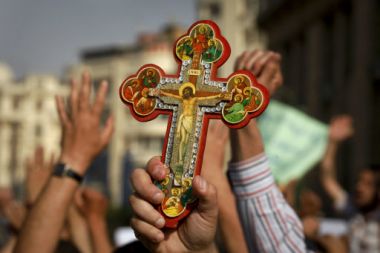After a terrible 2013, Christians in Egypt 'feel much safer' under President Sisi

2013 was a dark year for Egypt's Christians with multiple attacks on churches, and the months following the ousting of Mohamed Morsi only escalated the persecution against them.
Supporters of Morsi and Muslim Brotherhood lashed out at Christians in revenge for their supposed complicity in his removal from power.
Molotov cocktails were thrown at churches and graffiti was sprayed on their walls. Some of the attacks on Christians were fatal and at one point, churches started cancelling services.
But fast forward a year and the arrival of a new president, Abdel Fattah el-Sisi, and things are looking much better for Christians in Egypt, says Greek-Catholic priest Rafik Greiche.
Speaking to Aid to the Church in Need, he said the security situation is getting better and there is greater stability in the country.
Fr Greiche said the abduction of Christian girls by jihadists is still happening and there are still tensions in some villages but the situation has "nevertheless improved considerably".
"The mood has improved considerably," he said. "Christians feel a lot safer. They are going to church without feeling threatened as they did under President Morsi … The problems that exist are only one tenth of those that we Christians experienced under Morsi."
Fr Greiche's impression of President Sisi is also positive so far. Meetings have been held between the president and bishops from the Orthodox, Catholic and Protestant Churches, and the government is working with them to prepare a new law on the construction of churches.
Until now, building new churches in Egypt has been extremely difficult but it is hoped that the new law will simplify the process considerably by eliminating the need for presidential permission and clearance from the security authorities.
Permission would still have to be sought from the provincial governor but if no objections were raised within 60 days, Christians would be free to begin construction on their new church.
For now, Fr Greiche says, the legislation is being held up by the absence of a parliament and will have to wait until after the elections in a few months.
He admits to concerns that Islamists could once again play a major role in the Egyptian parliament.
"The problem is that the civilian parties are very weak and are not following a clear course," he said.
"They also don't have much backing. The Islamists will probably not have a majority, but they could form a substantial minority which will hold things up or delay them."











